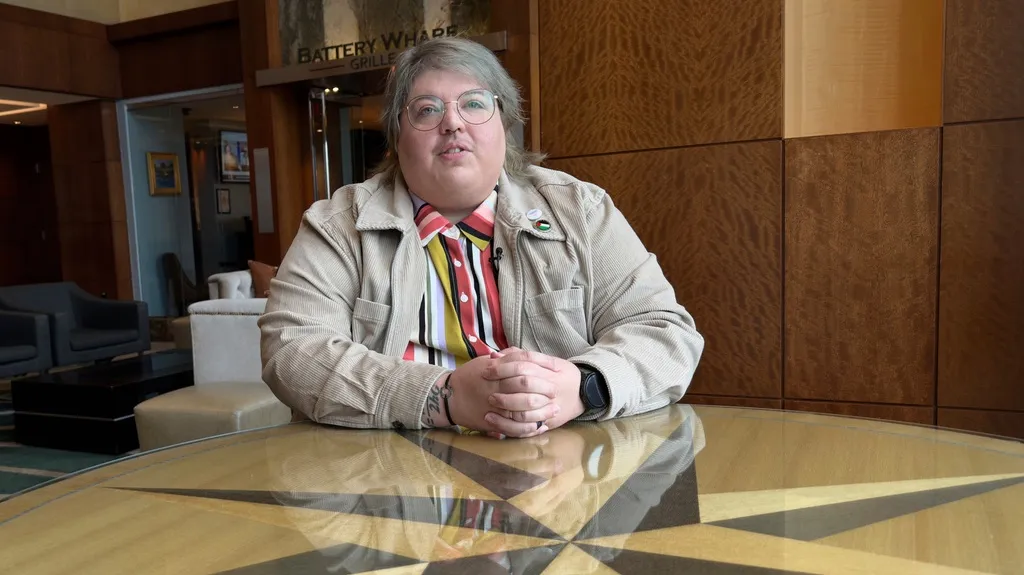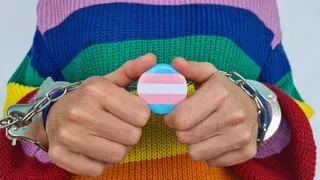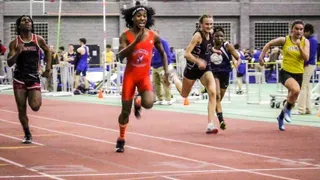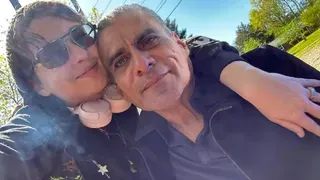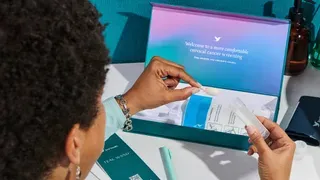August 26, 2011
Journalist Jose Antonio Vargas
Kevin Mark Kline READ TIME: 18 MIN.
Jose Antonio Vargas came out of his first closet in high school, when he told his classmates and family he was gay.
He came out of his second closet this summer, when he told the world he is an undocumented immigrant.
In his surprising, touching and much talked about New York Times essay, Vargas tells his story of being sent to America from the Philippines by his mother to live with his grandparents. Twelve-years-old when he arrived, it wasn't until he was 16 that he discovered he'd entered the country illegally.
Now 30, Vargas has built the kind of career a young reporter dreams of, much of it during his time at The Washington Post - covering the intersection of politics and technology in the 2008 presidential campaign; crafting a year-long series on AIDS in D.C. that was later adapted into the documentary The Other City; sharing a Pulitzer Prize with the Post team that covered the Virginia Tech massacre. During all that time, he was living with a secret that had the potential to end his career.
Reporting on himself - sifting through the history of his family and journey - hasn't been easy.
''I had to get it right,'' says Vargas. ''I only had one shot to tell this story and I had to tell it right, I had to be really accurate, or else people were just going to start picking holes in it.''
The story itself became a story when the news broke that The Washington Post had spiked the essay at the last minute. While the Times immediately picked up the piece, Washington's media class chewed over the question of why the Post had backed off. Slate media critic Jack Shafer dismissed Vargas's time in the immigration closet as a ''con.'' Post ombudsman Patrick Pexton wrote that Vargas had a reputation as ''a relentless self-promoter.'' Many others leapt to Vargas's defense, hailing his coming-out story as a watershed moment in the debate over immigration in America.
Despite the initial flurry of inside-journalism stories, Vargas has kept his focus on moving that debate forward, in large part through the launch of Define American, a new organization he co-founded to help elevate and change the discussion on immigration and the nation's 11 million undocumented persons. While the DREAM Act - the proposed legislation that would provide a path to citizenship to undocumented youth who, like Vargas, have lived their lives as Americans - remains a priority, and the Obama administration's recent announcement on immigration enforcement has been greeted as a needed, though limited, victory, Define American is as much focused on American citizens.
Because without those citizens, Vargas may never have been able to reach his own dreams.
''It sounds really crazy, but ever since I found I was undocumented I tried to very honestly live with this lie,'' he says, recalling how almost every person he came out to during his journey responded not with condemnation or rejection, but with offers of support and help. ''The American citizens, they're the ones who are my support network, my underground railroad.... I have been the beneficiary of such generosity from people, it's unbelievable.''
METRO WEEKLY: Obviously, the story you put out there is a very personal one. Has this been a time for you that's really about going back and considering your memories?
JOSE ANTONIO VARGAS: It's like excavating. I tell stories for a living and in many ways I think I just lost myself in other people's stories so I never had to confront my own. [Laughs.] My last big writing job was profiling Mark Zuckerberg for The New Yorker. Now I was reporting on myself, trying to get facts right, going back to my mother and asking her what had happened that day at the airport. I had never talked to her about that day. I had my own memory, she has her own memory. Her memory was that I was really excited. That wasn't my memory. So she reminded me how excited I was, which is really interesting.
METRO WEEKLY: What has your family's reaction been to the story?
VARGAS: I don't want to embarrass them, but a couple of my closest relatives actually were more fearful about my coming out so publicly as gay than me coming out as undocumented. I came out to them a long time ago, and it's not like this is a freaking secret. It floored me when one of my relatives said, ''Are you sure you're okay saying that?''
Like a lot of other Asian cultures, there is a lot of homophobia entrenched in the Filipino community. Like all countries, it's getting better but it's still pretty entrenched. I think they were kind of scared of that. But my family has been really supportive. For many of them, [my being undocumented] was a shock. Most of them didn't know.
METRO WEEKLY: I know that in immigrant families there can be a lot of pressure on kids to succeed. Is that something that you experienced?
VARGAS: One of the biggest ironies for me was that my grandparents and my mother wanted to give me a better life, but their idea of that better life was working an under-the-table job, or at a restaurant or in a nursing home, because that's what undocumented people are supposed to do. When I told him that I wanted to be a writer, my grandfather was like, ''There's no money in that. How are you going to support your family?'' Because I was going to inherit supporting my mother and her family. Somebody needed to send money every month to the Philippines, and who was going to do that on a writer's salary? They were very disappointed, but I was pretty stubborn. Once I found out that I was undocumented and confronted my grandfather about it, it was like I was in charge of my life. And that kind of lead up even to my coming out. It gave me the courage to just say, ''Here's another one - deal with that.''
METRO WEEKLY: What's the biggest assumption people make about you being Filipino?
VARGAS: People just always try to box me in and place me somewhere. But I think that's what we do to each other all the time, especially gay people. [Laughs.] But for me, to be a gay Asian-American is very interesting. In the hetero world, Asian men in many ways have been emasculated. I hate to say this, but Asian-American men are not represented in pop culture. Thank God for Kal Penn, John Cho, um.... See, I'm blanking out! And Daniel Dae Kim. Who can forget Daniel Dae Kim? But that's about it in the straight community. In the gay community, we have B.D. Wong.
METRO WEEKLY: And George Takei.
VARGAS: And George Takei. [Laughs.] When I was growing up, I was very insecure about what it meant to be Asian and gay, and the fact that you don't know who the role models are or what we're supposed to look like.
METRO WEEKLY: Have you experienced any racism within the gay community?
VARGAS: I spent Christmas of 2007 in Des Moines. I went to a gay bar - it was a country bar. I didn't know that, I just went. And I'll never forget this white dude comes up to me and says, ''You're pretty attractive for an Asian guy.'' I swear to God I just wanted to smack him. I didn't, of course. [Laughs.]
I don't think that was racism - I just think we all have our own preconceived notions. Like any member of a minority group, it took me a while to love and appreciate who I am and what I look like. It took me a while to really appreciate that. But when I was growing up, I didn't like being Asian. In many ways, I probably suffered from own preconceived notions.
METRO WEEKLY: What made you come to appreciate being Asian?
VARGAS: Because you have to. You grow up, you get wiser and you realize that you have to exist within your skin.
METRO WEEKLY: When it comes to immigration and undocumented people living in the U.S., I think the gay community tends to view those issues only through the prism of marriage. Would you agree?
VARGAS: Right now it is the most tangible way that they understand this very abstract topic. It's a simplistic prism that doesn't encompass the complexity of the issue. People have told me, ''Now that New York is allowing same-sex marriage, why don't you just get a boyfriend and just get married?'' God, that sounds so easy! Why don't I just go do that?
When I came out [as undocumented] to one of my friends - a D.C. journalist, a straight guy - he was like, ''Why don't we go to Iowa and get married?'' He's straight, but he's like why not, right? I'm like, that's really sweet, but immigration is under federal law, not state, and even though Iowa allows same-sex marriage, DOMA doesn't recognize that. One of my other friends said if I really want to challenge the government, why don't I marry a guy and then sue the government for not treating me equally? I'm like, ''I'm in enough trouble as it is!'' [Laughs.]
METRO WEEKLY: I have friends and acquaintances who are undocumented, but I know that many people just think of undocumented immigrants as the guys who hang out at 7-Eleven looking for day work.
VARGAS: We have such a narrative of who undocumented people are. They're the ones standing outside Home Depot waiting to mow your lawn, the ones who don't speak English, who don't want to assimilate to this country, who are just ''mooching'' off society. In many ways, that narrative is cemented in the minds of undocumented people across the country. This [coming out] was my way to say that that's not my narrative. But it's so much easier to just think that's who they are. I mean, hello, they call them aliens. We are locked into our images and our stereotypes, and if I've done anything, it's to kind of slap down that stereotype: It's a lot more complicated than that, we exist in various forms, and we're not all Latinos.
I can't tell you how many Latinos I've heard from who say, ''I'm so glad you're not Latino.'' [Laughs.] The fact of the matter is a lot of these anti-immigrant laws are anti-Latino laws. If I were driving in Alabama, where they just passed the most draconian law, they might not even stop me because I don't look all that Hispanic to them. I look more Asian, right? How about European immigrants? Not all undocumented people are Latino. They come from all parts of the world. The hardest truth is that we haven't been willing to face a lot of the angry rhetoric and just downright prejudice. I don't want to use the ''r'' word.
METRO WEEKLY: Why?
VARGAS: Because sometimes it can be really counterproductive. It's an unprecedented time to be living in this country, in which we are moving to becoming a minority-majority country. When I was in Arkansas, in South Carolina, in Kentucky, you talk to white people who are living in predominantly white towns and they feel like their country is being taken away from them. Beyonc� and Jay-Z are like the pop culture equivalent of Barack and Michelle Obama. All these Asian people have taken over the top universities of the country. It's like, ''Where's my country?'' I'm not saying it's right, but I can understand why they feel that way. To throw the ''r'' word around, to say a white person in Arkansas is ''racist'' because he or she feels this way - I would rather talk to that person and look them in the eye and ask them what is this really about?
If there's anything that ties this together, it's my fascination with how people identify themselves. I'm one of those people who ask, ''What kind of white are you? Are you Irish, are you Italian?'' People ask me all the time what kind of Asian I am, I should ask you what kind of white you are.
METRO WEEKLY: Can they tell you?
VARGAS: A lot of them can't. ''I'm just white.'' Well, dude, wait up a second, what do you mean you're ''just white''? Where are you from? One of the best moments I've had so far was at a Starbucks near my apartment, and this young white girl recognized me from The Colbert Report. She said she read my story and then called her grandpa and asked him about their immigration story. And I'm like, that's a win. I just want us learn our own history.
METRO WEEKLY: When your New York Times piece came out, there were two stories. One was the actual story you wrote about what it means to be undocumented in America. Then there was the meta-narrative about your story being moved from The Washington Post to the Times, and the reactions of some media critics. Was that second part something you expected, because you were taking a more direct, personal role in the story?
VARGAS: Look, I am a student of journalism. It's like my church. I knew that the media critics were going to do something: ''How can this journalist who's all about writing the truth of other people have lied about himself?'' I expected a strand of that. But I'm not sure I expected to be reading things like ''no one liked him in the newsroom'' or ''he wasn't trusted.'' That was hard. I literally moved to D.C. a day or two after graduating from college. I was so excited to be at The Washington Post at the Style section. I loved that place. It was my home. And the whole time I was thinking that I wasn't supposed to be there because I didn't have papers.
Every newsroom is competitive, has its own mores, has its own sets of rules, and the Post is not unlike any other. It's a very competitive place and I'm sure I was like a lot of young D.C. journalists. I was very ambitious because I had to prove myself. I remember I had lunch with David Hoffman [the assistant managing editor for the Post foreign desk] in March 2005, and he asked me if I had any interest in becoming a foreign correspondent. I excused myself and went to the bathroom to figure out how I tell David Hoffman I don't want to be a foreign correspondent. So I went back to the table and I said, you know, I grew up overseas, I'm not sure I'm interested in being a foreign correspondent. I don't remember exactly what he said to me, but it was along the lines that for making a name for yourself in the newsroom, being a foreign correspondent is one way to do that.
I was thinking to myself there's another way; maybe I can be a political reporter. I was 24, and in the hierarchy of the Post, political reporters are their own kind of lot. But how was going to join them? My beat was video games. I was like, I'm never going to be taken as a serious journalist. So I went to the editor of the Style section and said I wanted to write a year-long series on AIDS. So I was literally juggling video game reporting and AIDS reporting. But I thought if I was going to be taken seriously in this newsroom, I needed to do serious work. I can only imagine how craven or ambitious I might have seemed to people, like naked ambition, when really I just wanted to prove myself. I wanted to be as valuable as I could be.
METRO WEEKLY: Even if you were ''relentlessly self-promoting,'' as one writer put it?
VARGAS: I read that, and first of all I cringed. Second of all, I was like, really? This is Washington, D.C. People here size you up the moment they meet you: Who do you work for, how long have you been there, what college did you go to?
METRO WEEKLY: Why do you think the response from some people at the Post was so vituperative? Because it feels like, when reading it, there's bad blood on somebody's part.
VARGAS: I have no idea. Maybe people thought I was too ambitious, I don't know. I gotta tell you, it hurt because that was my home. Look, people are calling me much, much worse things elsewhere, but the difference is that mostly those people are strangers. The Post was a place where people knew me and so that's why it hurt. If they thought I was a self-promoter, man, I wonder what they think of some of the other staffers in there. [Laughs.]
We're living in an era where everybody has a brand - everyone has a Twitter account, everyone has a Facebook account. The question becomes, what is your brand about? For me, it's about my work, it's about what I do. Like, I wasn't a big cocktail person. There's so many cocktail things that happen. I went to some, but after a while I was just like, what do I really get out of that? All throughout this time, I'm thinking, "I don't have papers, I'm not supposed to be here, prove myself, prove myself, prove myself." Work was life. It was as simple as that. Thank God I loved it. [Laughs.] Oh, I loved it.
METRO WEEKLY: This is probably something you've been asked a thousand times, but how do you define what ''American'' is?
VARGAS: There's a Filipino writer named Carlos Bulosan who came to America as a kid [in 1930]. He wrote a book called America Is in the Heart. I do really believe that. I think America is in the heart. For me, specifically, it's a place that you call home.
America is an interesting thing because it's an ideal that you try to live up to. This country promises so much individuality when it says ''all men are created equal.'' Being an American is something that I've always wanted to live up to, and in many ways I'm trying as hard as I can to live up to it. I think you have to earn it. For me, it was something that I always had to earn. It's not just something that I was born with.
METRO WEEKLY: Do you think that people who were born here take it for granted?
VARGAS: Oh, yes. Sometimes I want to shake kids with passports: ''What are you waiting for?'' Meaning, I wish I could live my life as fully as I possibly can. I haven't been able to do that. There's this thing called American exceptionalism, there's actually a part of me that believes it. America is exceptional, the fact that America is still a meritocracy.
METRO WEEKLY: That's an interesting word, meritocracy. Meritocracy tends to be put forward as the idea that you can go so much further than your family background, that there are no blocks to where you can go. Maybe it's me getting older and more cynical, but I feel like there actually are far more blocks than we believed when we were younger. Do you really feel that the country is a meritocracy, or do you feel that maybe you're somewhat of an ''American exceptionalism'' yourself?
VARGAS: Ever since I found out I was undocumented, ever since I found out that I couldn't do certain things, I had to create a way that I could do those things. I had to believe that if I really wanted it bad enough I was going to get it. To me, that's meritocracy. No one can take away my work. No one can take away what I tried to do. And I'm just a writer, by the way. I've heard from maybe hundreds of undocumented people, many of whom are young people who want to be pre-med or a law student or an engineer. It just breaks your heart to read the stories, because this is a country that dares you to dream big and to think that you can't, is just tragic.
METRO WEEKLY: With Define American, do you have policy goals?
VARGAS: We are right now in such a political deadlock on the DREAM Act. There's only so much that this president can do - some can say that he hasn't done enough, and a part of me agrees with that. But at the end of the day there are three branches of government. And this Congress, especially the Republicans in Congress, haven't been willing to play ball. So more than talking about any specific policy point, we're trying to reframe the conversation.
When did we get to the point in this country that somebody who was born here as a first-generation American is an ''anchor baby''? When did we start thinking that immigrants are taking away and not adding to our country? Why is the perception that undocumented people are taking a slice from the pie, when really they're making the pie a lot bigger? The Immigration Policy Center [found that] undocumented people last year paid $11 billion in state and local taxes. How come we never hear about that figure?
When I decided to write my story, the biggest question was what purpose could it serve beyond me? I knew that I couldn't just write the article, which is where Define American comes in. I've never run an organization. The first person I told was my friend Jehmu Greene, who was the head of Rock the Vote. She is also the daughter of Liberian immigrants who at one point were undocumented, who became documented through Reagan's amnesty program in the 1980s. Then I met with Jake Brewer, who is like the white, straight brother from Tennessee I never thought I would have. He's one of the other co-founders. The third co-founder is Alicia Menendez, a senior advisor at NDN [a Washington think tank]; she's one of the rising millennial Hispanic women in the city.
We met for nine hours on April 6 and came up with a name - Define American - and then came up with our target groups. Our targets are women, young people, faith leaders and educators. I remember the entire time thinking of Michelle Malkin as my target group - a second-generation, Asian-American, Republican woman who hates the fact that she gets lumped in with these undocumented people. [Laughs.]
METRO WEEKLY: You mention Michelle Malkin, which actually brings up all kinds of things....
VARGAS: God, I want to meet her. I want to make her some adobo and some lumpia and we'll just talk.
METRO WEEKLY: But it's an interesting phenomenon, that second-generation Americans and immigrants who went through the system might have a much more conservative approach to undocumented people.
VARGAS: I completely understand that immigrants who came here legally can be upset and frustrated by these undocumented people who didn't get in line, who didn't follow the rules. Well, if you can show me a line, I'd be more than happy to get in the back of it and wait for as long as you want me to wait. But give me a line; there's no line.
Why was I sent here? I was sent here because my mother and my grandparents decided that my future resided in America. My mother didn't send me here because she wanted to get rid of her son, whom she hasn't seen for 18 years. She sent me here because she wanted to give me a better life. People are moving here for the same reasons that people have always moved to this country - they want a better life. What I don't understand is the kind of inhumane and overheated language that gets used, especially by people who come from immigrant families. Michelle Malkin is a daughter of Filipino immigrants, and she talks about immigrants as if they belong on some other planet. I don't understand that.
People speaking fluent Spanish, they're not a threat to Americans. Now, mind you, I think being in America people should speak English as much as they can. People should learn to speak English. I'm saying this as somebody who is the grandson of Filipino grandparents whose English wasn't that good. Whenever we were at the grocery store and my grandmother would be a little shy talking to the grocery clerk, my heart would drop. I didn't want a lack of knowledge of English to ever limit me. English is the language of the world. But at the same time, we're living in a globalized world and the more languages you speak, the better. I wish I spoke Spanish fluently, especially because people think I'm Spanish all the time. But my speaking fluent Tagalog doesn't make my English any worse.
METRO WEEKLY: What's your status now?
VARGAS: I am in no man's land, my friend. Thankfully, I have really good lawyers - pro bono, because I couldn't afford them. But I was pretty deliberate in writing the piece that I wrote. Thirty minutes before the article was going to close, one of my lawyer friends who was advising me was on the phone trying to convince me to take the word ''unlawful'' out, because I say something along the lines of I did things even though I knew they were wrong and unlawful. I said they were unlawful. She said, ''Jose, it's one thing for you to say it, it's another thing for you to write it in black ink in The New York Times.'' I asked her, do you have another word? She's like, ''You're the writer, you figure it out!'' There's no other word, it's unlawful!
METRO WEEKLY: ''Not completely legal.''
VARGAS: Not completely legal. [Laughs.] I was going to have to tell the truth about it. I remember telling the lawyers that if all I wanted to do was protect myself, I would not even be writing this from the get-go. Clearly the point was I wanted to make a statement, I wanted to write a story that illuminated the truth about immigration policy. I said, ''My personal case is the second concern, the first concern is really the story. But whatever I write, isn't it your job to protect me?'' [Laughs.]
You can't solve a problem without telling the truth about it. You can't. That's the problem in this city. That's the problem with this issue. No one has been able to come to the same table and really tell the truth about this. The system is broken, yes, but in many ways we haven't been able to fix it because some people benefit from it being broken. How much do you think those hamburgers would really cost if you had to pay for the tomatoes and the lettuce in the way you would if it weren't for migrant worker labor? How many people out there do we pay under the table at below minimum wage because they're undocumented? There was a bill introduced earlier this year in the state of Texas, that said you could be fined or jailed for knowingly hiring an illegal worker, unless the illegal worker was a nanny or a houseworker. I thought it was from The Onion, but it was a real bill.
If you want me to mow your lawn, I'll mow your lawn. But can you let us go to college, too?
METRO WEEKLY: You can move about the country now, but are you afraid of what could happen?
VARGAS: Whatever it is that I'm going through, I'm one of the lucky ones. I'm one of the lucky ones that when The Washington Post kills the story, I can call The New York Times and get it published there, thanks to Peter Baker. I'm in a really unique position to tell my story, but it can't just be about my story because it's just one story. My job right now is to figure out how do we elevate all these other stories. This is why I love living in New York. I can walk out of my apartment and get to Union Square and feel completely irrelevant and insignificant. I'm just one little dot in the ocean of people swarming around. I'm not scared because I'm just one of 11 million people.
For more information about Define American and Jose Antonio Vargas, visit defineamerican.com.
